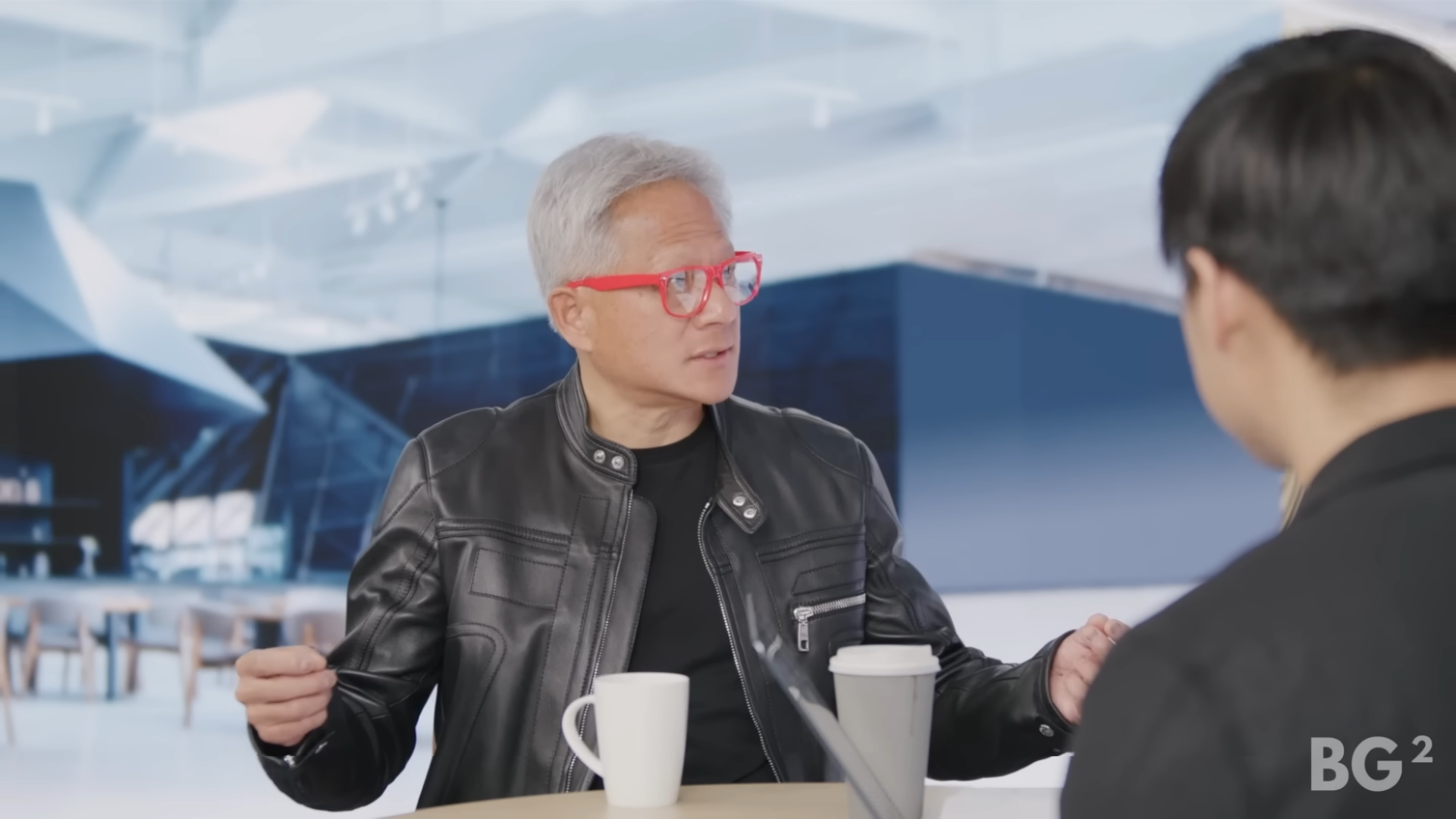Jensen Huang says China is ‘nanoseconds behind’ the US in chipmaking, calls for reducing US export restrictions on Nvidia's AI chips
As Chinese firms scale and U.S. export rules tighten, Nvidia is fighting to keep a foothold in China.

Nvidia CEO Jensen Huang says China is just “nanoseconds behind” the U.S. in chipmaking and that Washington should stop trying to wall off the market. Speaking on the BG2 podcast, Huang argued that allowing companies like Nvidia to sell into China would serve American interests by spreading U.S. technology and extending its geopolitical influence. “We’re up against a formidable, innovative, hungry, fast-moving, underregulated [competitor],” Huang said, talking about the pedigree of China’s engineers and controversial 9-9-6 working culture.
His comments come as Nvidia hopes to ship its H20 AI GPU to Chinese customers again, following a months-long pause tied to new U.S. export rules. The Commerce Department is understood to have begun issuing licenses for the H20 in August, and Nvidia is already working on a successor chip designed to comply with current restrictions while offering better performance. The company has not confirmed specs, but it would be Nvidia’s second attempt to tailor an AI accelerator specifically for the Chinese market since the original A100 and H100 bans took effect.

China, meanwhile, is accelerating its own plans to become self-sufficient. Huawei’s new Atlas 900 A3 SuperPoD systems, powered by the company’s Ascend 910B chips, are now shipping in volume. The company has laid out an ambitious roadmap through 2027 with next-gen Ascend silicon that aims to match or exceed current-gen performance. These systems are CUDA-free by design and optimized for Chinese-built software stacks, a shift that puts real pressure on Nvidia’s dominance, which, according to Huang, previously held a 95% market share in China.
Chinese hyperscalers are backing that roadmap with capital. Baidu, Alibaba, Tencent, and ByteDance are all investing in custom silicon, either through internal chip teams or by funding startups. That includes firms like Tencent, which has announced it has fully adapted its infrastructure to support homegrown silicon. Asked what he sees in the near future, Huang said, “They [China] publicly say… they want China to be an open market, they want… companies to come to China and compete in the marketplace… and I believe and I hope that we return to that.”
Nvidia’s approach to that is to maintain a foothold in China and play both sides of the geopolitical divide. The H20 may be hobbled compared to the company’s leading chips, but it gives Chinese companies a path to stay within the Nvidia ecosystem — at least for now.
Follow Tom's Hardware on Google News, or add us as a preferred source, to get our up-to-date news, analysis, and reviews in your feeds. Make sure to click the Follow button!
Get Tom's Hardware's best news and in-depth reviews, straight to your inbox.

Luke James is a freelance writer and journalist. Although his background is in legal, he has a personal interest in all things tech, especially hardware and microelectronics, and anything regulatory.
-
EyadSoftwareEngineer Mr Jensen your calls for reducing US export restrictions is now usless, China literally banned Nivdia now, China reached the goal it need in AI, the ship has sailed!Reply -
Stomx Was I in coma recently? In a blink of an eye the rhetoric in hi-tech shifts from China years and even decades behind to just a nanosecond behindReply -
bit_user Jensen's job, at this point, is basically to try and keep Nvidia share price going up for just a little bit longer. In order to do that, he needs to find and exploit any sizable market that's not already saturated. China is the biggest, and therefore not one he can ignore. So, he's trying to find any angle he can, regardless of how true it is, to argue for rolling back restrictions.Reply
That's called leverage!EyadSoftwareEngineer said:Mr Jensen your calls for reducing US export restrictions is now usless, China literally banned Nivdia now,
I think China probably understands Jensen's situation and is playing him. That's why they've told their AI companies not to buy any more Nvidia chips. They're trying to maximize their leverage, because they see that he has an influential voice.
I'm pretty certain that ship will indeed return to harbor, if the winds are favorable. Indeed, I think Jensen is betting on it!EyadSoftwareEngineer said:China reached the goal it need in AI, the ship has sailed! -
A Stoner Due to his position these statements should come with potential legal consequences if they are lies. China is still years away from being competitive with today's technology and decades away from ever actually catching up with the west and being on par at date.Reply -
bit_user Reply
Oh, no. the rhetoric didn't shift. There have always been two sides, with China hyping up how fast it's advancing and knowledgeable outsiders refuting such claims. The key thing is to pay attention to is who the message is coming from and what their interests are.Stomx said:In a blink of an eye the rhetoric in hi-tech shifts from China years and even decades behind to just a nanosecond behind
Jensen doesn't really care where his chips are made. From his perspective, more competition in the chip manufacturing business is a good thing! So, his interests in the chip-making war are somewhere between neutral and more in line with SMIC becoming competitive. More importantly, he sees Nvidia products getting entangling in the conflict, and so he's going to take whichever position is more favorable to getting the Chinese market opened up to his products. -
bit_user Reply
If it's not made in a SEC filing or under oath, then no. He's a US citizen and, as such, he's entitled to having the government place no restrictions on his freedom of speech, other than a small number of narrowly-defined exceptions (e.g. national security).A Stoner said:Due to his position these statements should come with potential legal consequences if they are lies.
If he were disparaging of a commercial party, he could be sued for libel, but that's a civil matter. I suppose his investors could also sue him, if they felt he was saying things counter to the interests of Nvidia, but that would also be a civil matter. The only other thing that comes to mind is if he were saying something with a provable intent of share price manipulation, but such court cases are fairly difficult to prosecute, as the standard of evidence is quite high.
I pretty much agree with that, but we don't jail people we simply disagree with.A Stoner said:China is still years away from being competitive with today's technology and decades away from ever actually catching up with the west and being on par at date. -
zsydeepsky Well, China is neither "decades behind" nor "nano-seconds behind".Reply
My estimation is about 3-5 years behind; the time varies depending on how fast China can make its own solutions that can match ASML EUVs. (since the final solution might not even be a Chinese version of EUV, so it's also kinda hard to evaluate at this point)
The 3-5 year time window is tricky at this point, as it is close enough to keep the Chinese industry functioning relatively healthy, and also far enough to make Beijing want some trade protection. This led to the Nvidia "double-sanctions" trouble: the US and China both want to have Nvidia cards out of the Chinese market. But in the software world, Nvidia wants its product and software stack to reach a monopoly, hence you get this news. -
A Stoner Replybit_user said:If it's not made in a SEC filing or under oath, then no. He's a US citizen and, as such, he's entitled to having the government place no restrictions on his freedom of speech, other than a small number of narrowly-defined exceptions (e.g. national security).
If he were disparaging of a commercial party, he could be sued for libel, but that's a civil matter. I suppose his investors could also sue him, if they felt he was saying things counter to the interests of Nvidia, but that would also be a civil matter. The only other thing that comes to mind is if he were saying something with a provable intent of share price manipulation, but such court cases are fairly difficult to prosecute, as the standard of evidence is quite high.
I pretty much agree with that, but we don't jail people we simply disagree with.
Yes, a CEO can be in significant legal jeopardy for lying to the public about the condition of their company. This can result in both civil and criminal charges, especially when the company is publicly traded and the misrepresentations are material to investors.
Sorry, but when you take on the position of leadership in a company, your ability to lie about the company or things directly related to it are in fact limited! -
Zaranthos Reply
Huang is a cheerleader for Nvidia, from Taiwan, and probably acutely aware of the precarious situation Taiwan is in geopolitically. China wants Taiwan and if US dominance falls to China Taiwan falls with it. The fear is that if China wins the AI race, which is heavily influenced by semiconductor dominance, China dominates the world and Taiwan succumbs to China control. Take his rhetoric with a grain of salt considering where his bias lies. Is he right? Definitely not literally, but China's ambitions and drive are pretty clear and China is not hindered by ethics, morality, environmental groups, government regulations, etc. They're playing to win and most of the rules the rest of the world has to deal with don't apply in China.Stomx said:Was I in coma recently? In a blink of an eye the rhetoric in hi-tech shifts from China years and even decades behind to just a nanosecond behind